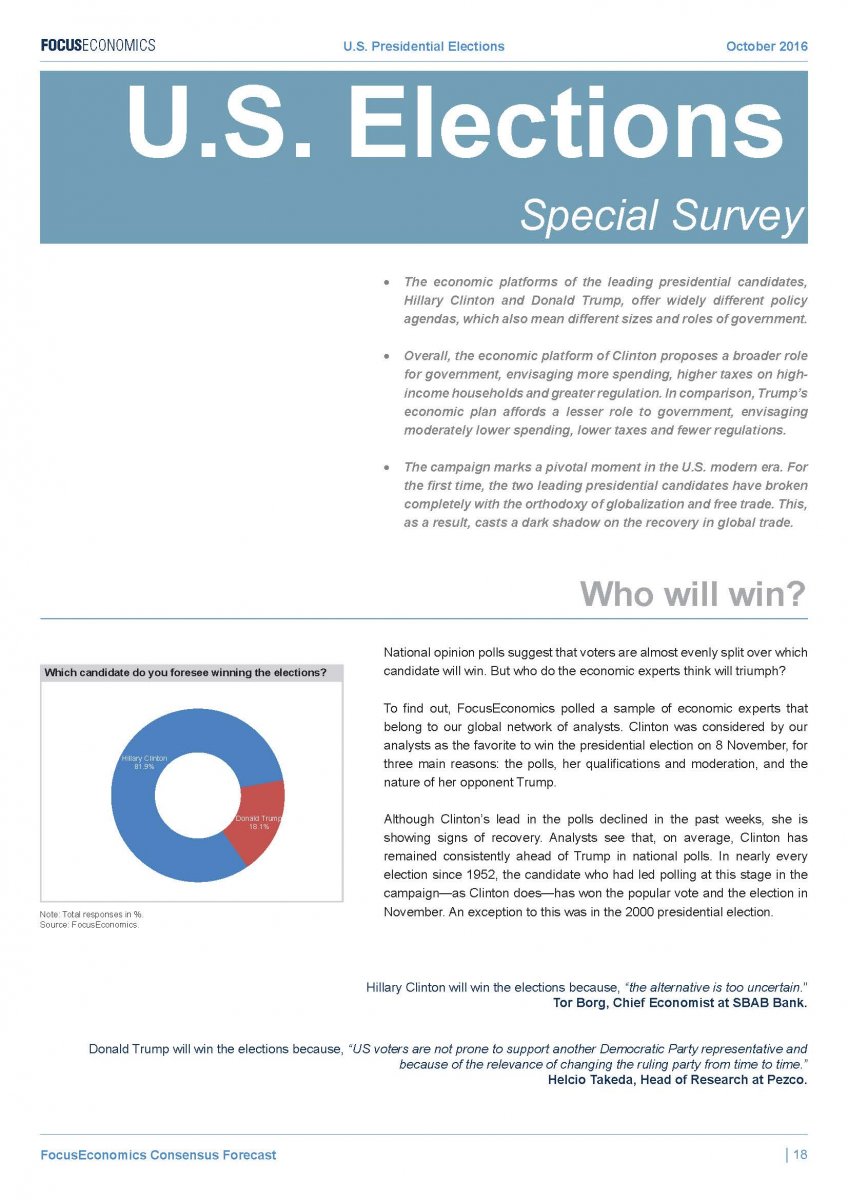Most economists surveyed believe election-related uncertainty is hampering U.S. economic activity. While any election spurs some uncertainty, 60% of respondents to the FocusEconomics survey suggest the current economic cycle is particularly unusual in its behavior.
“Analysts see the current uncertainty over tax reforms, healthcare and general political environment holding back investment and denting 2016 growth prospects,” said Ricardo Aceves, Senior Economist for the United States at FocusEconomics. Analysts have trimmed their GDP growth forecasts for the U.S. over the course of this year and now expect growth of 1.6% in 2016, which is down from 2.5% at the beginning of the year.
Looking at each candidate’s individual policy areas, the economic experts surveyed rated Clinton higher than Trump in all areas. Clinton received the highest score for her immigration policy, followed by monetary and energy policies. The Democratic candidate received lower marks in tax reform and government spending. On the other hand, Trump obtained the highest marks for his minimum wage and energy policies, while he scored low for immigration and foreign trade.
“In order to keep the economy moving, analysts rate Clinton’s overall economic plan higher than Trump’s, credit her with a better grasp of economics, and think her more likely to appoint a good economic team,” noted Aceves.
On appointing the best economic team, economists clearly prefer Clinton: by 75% to roughly 6%, they think the Democratic candidate will be surrounded by the best team of economic policy advisors and that she will make wiser appointments to the Federal Reserve.
 |
U.S. Elections Special Report Poll of 70+ macroeconomists Latest U.S. forecasts from the world’s leading institutions |
The majority of the surveyed economic experts think that under Clinton’s plan the U.S. economy will grow faster in both the short- and medium-term, with interest rates increasing moderately. “Stimulus will go through education, infrastructure spending, immigration and minimum wages,” said Gregory Daco, Chief U.S. Economist at Oxford Economics.
Meanwhile, Trump’s fiscal policies are expected to be highly stimulatory initially, but his other policies are likely to be inflationary and given that the economy is near full employment, the Fed’s reaction will likely be stronger. Analysts also consider Trump’s trade policies as highly disruptive both domestically and abroad. Under Trump’s proposed economic plan, “in the short run vast fiscal stimulus, including tax cuts, would strengthen growth. But in the long run, a combination of protectionism and a yawning fiscal gap would hurt confidence in the economy,” commented Tim Cooper, Global Economist at BMI Research.
The FocusEconomics U.S. Elections Survey, released Tuesday, was conducted 12 to 19 September among chief economists and senior economists from leading international and local economic institutions worldwide.